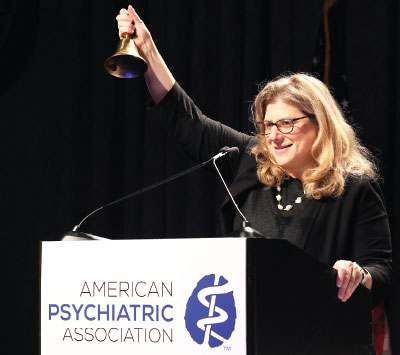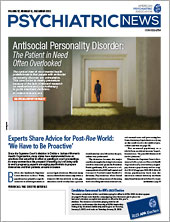Collaboration was the theme of this year’s Mental Health Services Conference, “Facing Our Future Together: Empowering Mental Health Care Teams With Practical Solutions to Emerging Challenges.” The conference took place in Washington, D.C., in late October.
“This meeting is so important for the moment we are in when our nation is [having] a mental health pandemic,” said APA President Rebecca Brendel, M.D., J.D., in remarks at the opening plenary. “We know we are seeing an unprecedented need and demand for mental health services. In a recent poll by APA and Morning Consult, 79% of Americans—that’s 4 in 5—said they believe mental health is a public health emergency that needs more attention from our lawmakers.
“I cannot remember a time when mental health was such a large part of our national conversation,” Brendel said. “Psychiatrists make up only 6% of the mental health workforce in this country. We know that in order to meet our shared goals, we need to learn to work with each other, to partner with each other, and together to develop innovative and practical solutions for the future.”
Presented in collaboration with SMI Adviser and the APA Foundation, this year’s conference brought together a variety of allied mental health professionals—psychologists, social workers, and nurse practitioners, among others—to generate practical approaches and solutions that can influence systems-level change to benefit patients.
APA CEO and Medical Director Saul Levin, M.D., M.P.A., echoed Brendel’s comments. “The number of [psychiatric inpatient] beds has dropped precipitously since the 1970s,” he said. “That’s why it’s important that we are all here today. It will take bold action by all of us to address the persistent problems affecting mental health in America and to implement the foundational changes needed to fix our broken health care system. Most importantly, it will take collaboration to realize our goal of remaking the health care system and improving mental health care for everyone.”
Brendel said APA is working “tirelessly” to connect with communities, seeking out places where Americans work, worship, and learn. “These are the places where people first seek support or are connected with mental health resources before being seen by a physician or other licensed professional.”
“We are in these spaces because of a truth that seems obvious but bears repeating: Mental health needs constant attention and affects all of our lives. As evidenced by our poll data and the ongoing conversations in our public spaces, Americans are not only becoming increasingly aware of this fact, they are demanding that we and our leaders act. This is encouraging but also underscores the weight of the task we have in front of us.” ■

